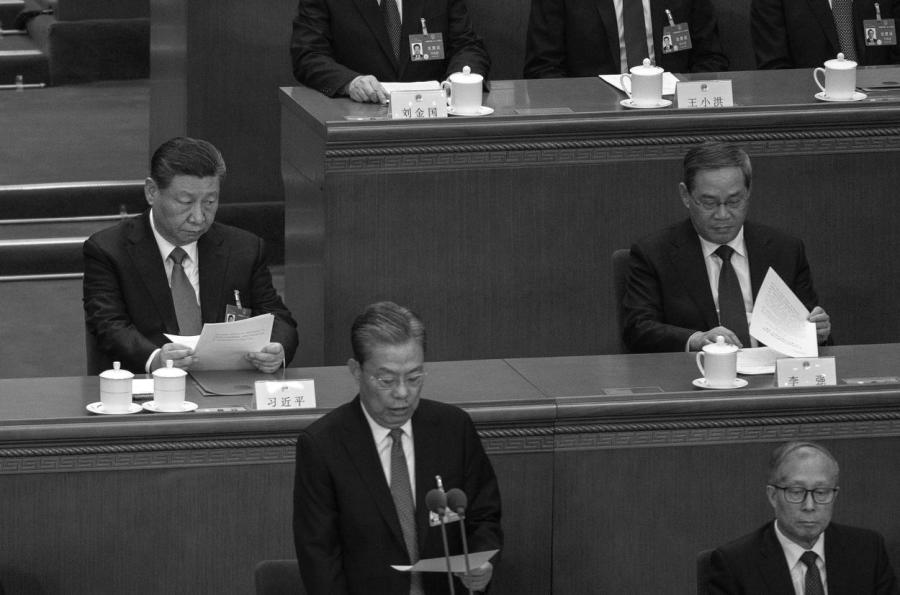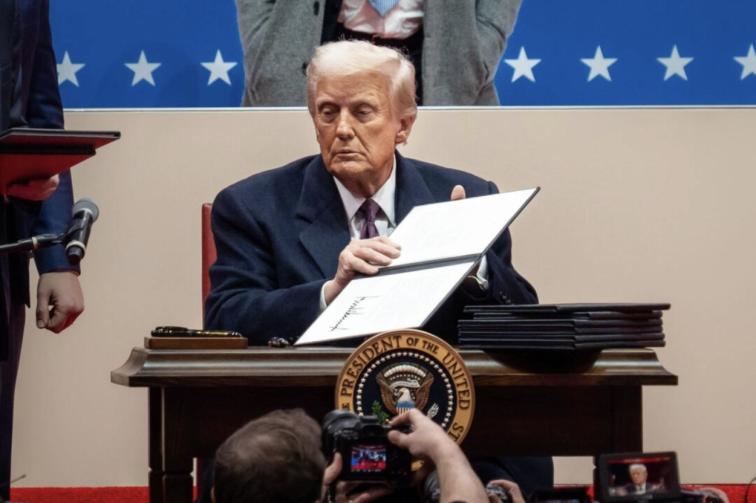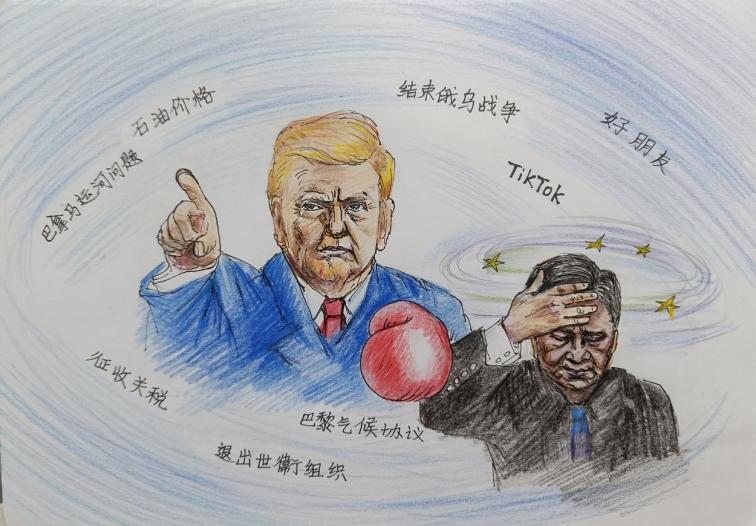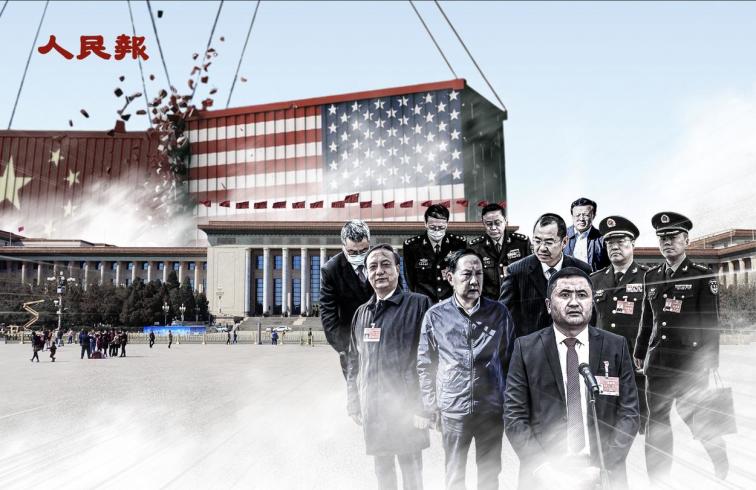File photo: Chinese Communist Party leader Xi Jinping and Premier Li Qiang (right) at the closing meeting of the National People's Congress in the Great Hall of the People. (Photo by Kevin Frayer/Getty Images)
[People News] Recently, two unusual developments involving close allies of Xi Jinping have drawn widespread attention. One is the unexplained absence of Vice Chairman of the Central Military Commission (CMC) He Weidong at a high-profile event; the other is the quiet replacement of Central Organization Department head Li Ganjie by Shi Taifeng. Analysts view this as a clear sign of Xi Jinping’s waning power.
On April 2, CMC Vice Chairman Zhang Youxia, along with CMC members Liu Zhenli and Zhang Shengmin, joined Beijing Party Secretary Yin Li in Tongzhou, Beijing, to take part in the annual tree-planting event — a tradition that has continued for 43 years. However, He Weidong was notably absent from this year’s event and was not mentioned at all in state media reports. Given that CMC vice chairmen have historically attended and been referenced in past reports on this event, this has fueled growing speculation that He may have already been detained.
At a regular press conference held by the Ministry of National Defense in late March, a foreign journalist asked whether He Weidong had been taken away. The spokesperson replied only, “I’m not aware of the relevant situation,” and the question was omitted from the official written transcript, marking the most recent public mention of He by the Chinese authorities.
Citing Newsweek and The Washington Times, Bloomberg reported that He Weidong may be under investigation for corruption. However, the CCP has not officially confirmed this.
Another incident drawing similar attention is the sudden change in leadership at the Central Organization Department, with Li Ganjie quietly being replaced by Shi Taifeng.
On April 2, the website of the Central Organization Department reported that Shi Taifeng, a member of the CCP Politburo and now the head of the Organization Department, had been inspecting the department’s efforts to implement the “Eight-Point Regulation” — a euphemism for overseeing an internal rectification or purge campaign. Meanwhile, Li Ganjie has been transferred to head the United Front Work Department (UFWD).
The United Front Work Department is primarily responsible for implementing the CCP’s united front strategy, including policy-making and coordination in areas such as multi-party cooperation, ethnic and religious affairs, the private economy, and overseas Chinese affairs. In essence, it is a department with little real power.
In contrast, the Central Organization Department controls personnel matters, holding sway over the careers and fates of officials. The so-called “rectification” campaign means wielding life-or-death power over which officials stay or fall.
Li Ganjie is a close confidant of Xi Jinping and a key figure in Xi's inner circle. This raises the question: Why has Xi Jinping chosen to overlook him and instead granted significant authority to Shi Taifeng?
Shi Taifeng, born in 1956, has been affiliated with the Chinese Communist Party (CCP) since completing his master's degree in 1985. He has held various roles, including Director of the Law Department in the Scientific Socialism Teaching and Research Section at the Party School and Director of the Political and Legal Teaching and Research Section. In July 2001, he was appointed Vice President of the Central Party School of the CCP, while also serving as Minister of the Organization Department and Director of the Political and Legal Teaching and Research Section, achieving the rank of deputy minister. By April 2002, he had become Vice President of the Central Party School. In February 2008, he was elected as a representative to the 11th National People's Congress (NPC) and served as a member of the Standing Committee of the 11th NPC and the NPC's Legal Committee.
Subsequently, he held several important positions, including Deputy Secretary of the Jiangsu Provincial Party Committee, Governor of Jiangsu Province, Secretary of the Ningxia Hui Autonomous Region Party Committee, Secretary of the Inner Mongolia Autonomous Region Party Committee, and President of the Chinese Academy of Social Sciences. He has also served as an alternate member of the 18th Central Committee, a member of the 19th Central Committee, a member of the 20th Politburo, and a Secretary of the Central Secretariat.
His resume indicates that Shi Taifeng's deputy ministerial rank is closely tied to the Jiang faction, specifically granted by Zeng Qinghong, who was then the Minister of the Organization Department.
From December 2002 to December 2007, Zeng Qinghong served as the President of the Central Party School, while Shi Taifeng was appointed Vice President in April 2002, acting as Zeng's deputy. This highlights the significant Jiang faction influence in Shi Taifeng's career.
Most CCP officials at the deputy ministerial level and above have reinforced their party loyalty at the Party School, boldly committing themselves to the party.
Shi Taifeng reached the vice-ministerial level as early as 2001, but it wasn't until 2015 that he was promoted to the ministerial level. This clearly shows that Shi is not affiliated with the Hu-Wen faction, nor is he a subordinate of Xi Jinping. Notably, Xi Jinping's brother, Chen Xi, did not seem to have a favorable opinion of Shi Taifeng, allowing him to slowly navigate the path of political correctness and unwavering loyalty for several years.
During the 20th National Congress of the Communist Party of China, Xi Jinping appointed Shi Taifeng, possibly as part of a deal for re-election with the Jiang faction. His recent transfer to the Minister of the Organization Department was likely not Xi's original plan. It may be a temporary measure to counter anti-Xi forces, further diminishing Xi's control over personnel decisions.
From another angle, the incidents involving several theater commanders and Vice Chairman of the Central Military Commission He Weidong, along with Li Ganxi's position being replaced by Shi Taifeng, suggest that Xi Jinping, as the 'big brother managing personnel' within the CCP, is unable to leverage anti-corruption efforts to consolidate power. Instead, many of his appointees have been ousted on corruption charges, which have been exploited by anti-Xi factions. Shi Taifeng's leadership of the Organization Department is seen as a significant event for officials who are deeply entrenched in the CCP's factional battles. This is because Shi Taifeng is here to enforce discipline, targeting those who are unpopular with others. For the Xi faction, the gradual approach towards a precarious situation is becoming increasingly apparent.









News magazine bootstrap themes!
I like this themes, fast loading and look profesional
Thank you Carlos!
You're welcome!
Please support me with give positive rating!
Yes Sure!